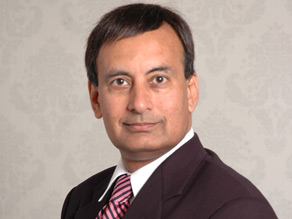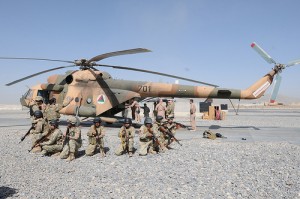Rogin Obtains Proof Mullen Received Ijaz Memo, Pakistan Ambassador Recalled, Offers Resignation
Back on October 10, Mansoor Ijaz, an American from a Pakistani family, published a remarkable column in Financial Times in which he claimed to have been involved in the passing last May of a memo purportedly from Pakistan’s President Asif Ali Zardari to Michael Mullen, who was at that time Chair of the Joint Chiefs of Staff. Ijaz described the memo as being prepared out of fears that Pakistan faced an imminent military coup as fallout from the government’s embarrassment over the ease with which the US carried out its mission to kill Osama bin Laden inside Pakistan. After Josh Rogin published denials from Mullen on November 8 that Mullen had any knowledge of the memo, Ijaz responded by publishing a number of communications with a Pakistani official from the time period in which the memo was being crafted. These communications are widely believed to have been with Husain Haqqani, Pakistan’s Ambassador to the United States. In a flurry of action yesterday, Josh Rogin provided confirmation from Mullen that he had indeed received the memo, Pakistan recalled Haqqani for discussions and Haqqani offered to resign.
Unfortunately, the draconian “Terms and Conditions” at Financial Times prevent treatment of their material in the same way sane publications can be excerpted for quotes, so it will be necessary for readers to go through their ridiculous “free registration” process to read the Ijaz column in full at the link above. Suffice it to say that Ijaz described an offer represented as coming from Zardari to eliminate the branch of Pakistan’s secret Interservices Intelligence Agency (ISI) that deals with the Taliban and the Haqqani Network. Zardari sought US protection for taking such action.
Here is the denial Rogin obtained on November 8 from Mullen’s spokesman, Captian John Kirby:
“Adm. Mullen does not know Mr. Ijaz and has no recollection of receiving any correspondence from him,” Kirby told The Cable. “I cannot say definitively that correspondence did not come from him — the admiral received many missives as chairman from many people every day, some official, some not. But he does not recall one from this individual. And in any case, he did not take any action with respect to our relationship with Pakistan based on any such correspondence … preferring to work at the relationship directly through [Pakistani Army Chief of Staff] Gen. [Ashfaq Parvez] Kayani and inside the interagency process.”
Rogin goes on to describe Pakistani denials from that same time period:
Mullen’s denial represents the first official U.S. comment on the Ijaz memo, which since Oct. 10 has mushroomed into a huge controversy in Pakistan. Several parts of Pakistan’s civilian government denied that Ijaz’s memorandum ever existed. On Oct. 30, Zardari spokesman Farhatullah Babar called Ijaz’s op-ed a “fantasy article” and criticized the FT for running it in the first place.
“Mansoor Ijaz’s allegation is nothing more than a desperate bid by an individual, whom recognition and credibility has eluded, to seek media attention through concocted stories,” Babar said. “Why would the president of Pakistan choose a private person of questionable credentials to carry a letter to U.S. officials? Since when Mansoor has become a courier of messages of the president of Pakistan?”
Here is the admission from Kirby that Rogin obtained yesterday on the existence of the memo:
“Adm. Mullen had no recollection of the memo and no relationship with Mr. Ijaz. After the original article appeared on Foreign Policy‘s website, he felt it incumbent upon himself to check his memory. He reached out to others who he believed might have had knowledge of such a memo, and one of them was able to produce a copy of it,” Kirby said. “That said, neither the contents of the memo nor the proof of its existence altered or affected in any way the manner in which Adm. Mullen conducted himself in his relationship with Gen. Kayani and the Pakistani government. He did not find it at all credible and took no note of it then or later. Therefore, he addressed it with no one.”
Rogin also spoke with Husain Haqqani:
In an interview late on Wednesday afternoon, Washington time, Haqqani confirmed to The Cable that he will travel to Islamabad and has sent a letter to Zardari offering his resignation.
“At no point was I asked by you or anyone in the Pakistani government to draft a memo and at no point did I draft or deliver such a memo,” Haqqani said that he had written in his letter to Zardari.
“I’ve been consistently vilified as being against the Pakistani military even though I have only opposed military intervention in political affairs,” Haqqani said that he wrote. “It’s not easy to operate under the shadow of innuendo and I have not been named by anyone so far, but I am offering to resign in the national interest and leave that to the will of the president.”
Rogin goes on to speculate on the possibility that Zardari may sacrifice Haqqani in order to quell the controversy surrounding the memo, but from Haqqani’s statements Rogin provided, it does not appear that Haqqani will go quietly.
Dawn, which is usually considered to be closely aligned with Pakistan’s military, described yesterday’s events in this way:
A senior diplomatic source, when asked to comment on reports Ambassador Haqqani had sent his resignation to the president, said: “We cannot call it a resignation. He has sent a letter to prove that he is not guilty.”
In his message, the ambassador is believed to have written that he was not responsible for the letter that allegedly sought US support for sacking the ISI and army chiefs. The ambassador offered to resign if proven guilty.
Haqqani left his office at lunch and did not return. Before leaving, he sent an email to dozens of Pakistani journalists, giving details of a news conference he addressed in the morning on ties with US.
Earlier in the day, Information Minister Firdous Ashiq Awan said the government had summoned Ambassador Haqqani to Islamabad to learn more about a letter ‘falsely’ attributed to the president.
The Express Tribune chose merely to run a Reuters article that rehashes Rogin’s revelations (without citing him).
It will be very interesting to see what unfolds when Haqqani arrives in Islamabad.


